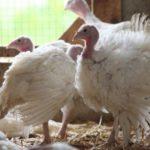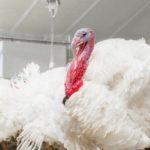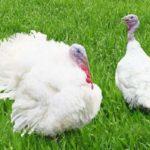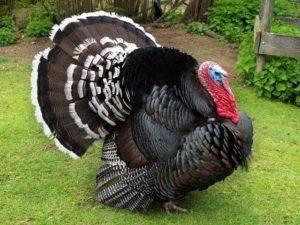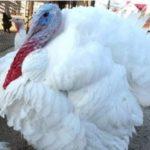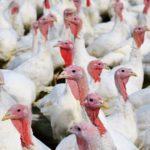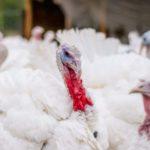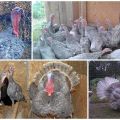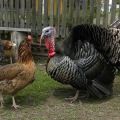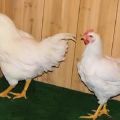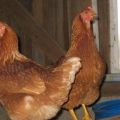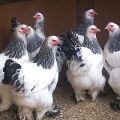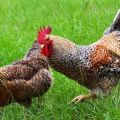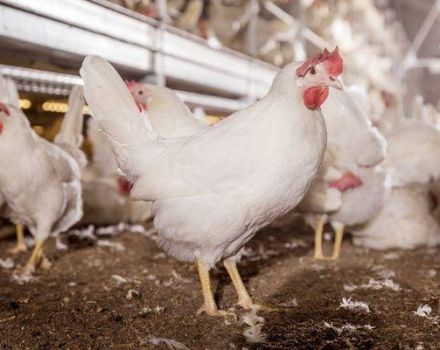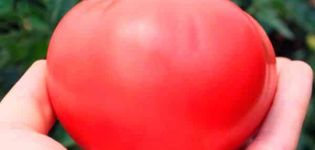Description and characteristics of grade maker turkeys, breeding
Grade maker turkeys are a meat cross that combines the best characteristics of poultry. This breed is considered one of the most popular - it is often grown in small farms. To obtain high productivity parameters, it is important to follow the basic recommendations for bird care. Balanced nutrition and the prevention of pathologies are of great importance.
The appearance and characteristics of grade maker turkeys
Turkey Great Marker is a hybrid cross, which belongs to the medium-heavy varieties. It is characterized by a massive body that is covered with fluffy white feathers. Birds have an even and wide chest. They are characterized by a long curved yellowish beak. In males, it is decorated with red stripes.
The head is small. It has a pink or reddish tint. The earrings are long and red. In some individuals, the face near the eyes has a blue color. Birds are characterized by rapid growth rates. By 4 months, males reach 19-20 kilograms, and turkeys - 9-11.
During the reproductive period, females produce 80-100 eggs. On average, they produce 12 eggs per month. Their weight is 85 grams. The hatchability parameters are at 87%.
Positive and negative sides
The main disadvantage is the high sensitivity of the cross to temperature fluctuations. Turkeys develop fully only in warmth.
Subtleties of maintenance and care
Since birds of this breed are considered very thermophilic, they need to provide a dry and warm room. It is important to maintain adequate light levels. However, there should be no windows in the house. The organization of the place for cleaning is also important.
To prevent turkeys from encountering parasites, it is recommended to install a box filled with sand and ash in the house.
Turkeys prefer roosting. They are distinguished by their high body weight, so the timber should be quite thick. Each bird should have at least 40 centimeters of space. In height, the perch should be 80 centimeters, and the width between the places should be at least 60.
To avoid overweight, birds need long walks. Their duration should be at least 1 hour. Therefore, birds should equip a walking area. It is certainly recommended to protect it with a fence, since the representatives of the breed are capable of flying high. It is also permissible to trim the wings of young birds.
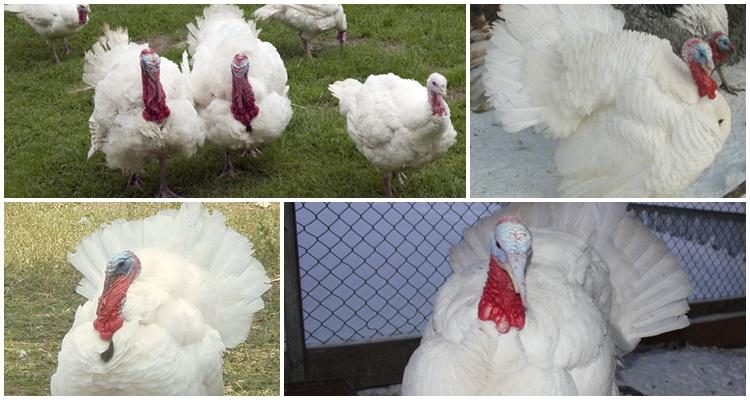
Turkeys of this breed are characterized by a very quarrelsome character. During fights, they are capable of severely crippling each other. Therefore, it is permissible to keep a maximum of 5 turkeys and 40 turkeys in one place. For high egg production, it is required to equip the birds with a place. The nests should be 15 centimeters high and 60 centimeters wide. These sizes are suitable for 4-6 turkeys. Hens are very caring. They are capable of caring for many chicks.
Drawing up a diet
Turkeys of this breed should be fed abundantly enough. At the same time, it is required to give them food 3 times a day. During the mating season, the frequency of feeding is increased up to 5 times a day. Sometimes ready-made types of feed or homemade mixtures are used for this. They should be chosen taking into account the age category and season. Constant access to clean water is also important. In winter and summer, it is worth adding vitamins to food. For this, fresh herbs or hay are used. Chicks need a more complex diet. During the first month, they should be fed up to 8 times a day. At the same time, age affects the diet:
- From 1 to 6 days, the turkeys are given chopped boiled eggs. They should be used in combination with wheat grits.
- On days 7-21, it is permissible to start giving cottage cheese, fish, cake.
- From the 20th day, you can add other cereals - millet and corn.
- At 5 weeks of age, you can give the birds fresh grass. For this, cabbage, clover, alfalfa are suitable.
Adult turkeys require grain. It can be dry and germinated. To prevent the birds from experiencing a deficiency of vitamins and minerals, a combination of different types of cereals is required. In the summer, fresh herbs are introduced into food. The food should be constantly changed to avoid stagnation of old food in the feeders.
Breeding the breed
Turkeys produce their first eggs at 9 months. During the reproductive period, they produce 100 eggs. Females produce large eggs weighing 80-85 grams. The hatchability parameters are considered to be quite high and amount to 87%. Eggs are mainly used for breeding. It is permissible to leave them for incubation of females. However, it is better to put it in an incubator right away. All the necessary conditions have been created there for breeding chicks.
Frequent bird diseases
The birds of this breed are characterized by good immunity. However, birds cannot stand the effects of drafts. Turkeys are resistant to most infections. At the same time, it is important to vaccinate against such pathologies:
- chicken coccidiosis;
- rhinotracheitis;
- atypical plague.
Vaccination should be carried out exclusively by a veterinarian, and only healthy birds are recommended to be vaccinated. If there are symptoms of pathologies, it is better to refuse the procedure. After vaccination, birds need to be isolated for a while. Grade maker turkeys are considered popular birds with high productivity. For birds to grow and develop quickly, they need to provide comprehensive care.
